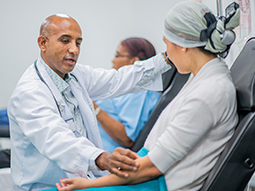Nasopharyngeal cancers are rare, malignant (cancerous) growths found in the nasopharynx, the upper part of the throat behind the nose. Because of their location, they are highly treatable if caught early.
Symptoms
Symptoms may include:
- Lumps in the neck
- Nosebleeds
- Sore throat
- Nasal obstruction
- Changes in speaking
Other condition can also cause these symptoms, so it’s important to see a doctor right away.
Risk factors
No one knows why cells grow out of control and form nasopharyngeal tumors. There are certain risk factors, though:
- Chinese or other Asian ancestry
- Exposure to the Epstein-Barr virus (EBV), a herpes virus that normally causes mild symptoms and is transmitted through bodily fluids like saliva, sex, blood transfusions, and organ transplants.
Diagnosis
To make a diagnosis, our doctors:
- Take a full medical history.
- Perform a complete head and neck exam.
- Possibly remove a small amount of the tumor during a biopsy, for further study.
- Potentially run lab and imaging tests, including:
- X-ray
- MRI
- CT (CAT) scan
- PET scan
- Nasal endoscopy: uses a long flexible instrument (a nasal endoscope) with a light and camera, and may be combined with a biopsy.
These exams and tests help the doctor determine:
- The type of cancer and its stage
- How aggressive it is
- Whether it has spread
- How best to treat it
Treatment
Treatment options depend on:
- The cancer’s type and stage
- The size of the tumor
- Your age and overall health
Nasopharyngeal cancer is generally treated with radiation or radiation with chemotherapy. In later stages, radiation may be combined with surgery to remove lymph nodes where the cancer has spread. We also offer a number of clinical trials.
Follow-up care
Patients who have had nasopharyngeal cancer are at risk of developing a second head or neck cancer, and our doctors also want to catch any original cancer that might return (recur). After treatment, they will ask you to come in for regular check-ups, as frequently as once a month for the first year.
Our providers

Expert oncology care
Getting the care you need starts with seeing one of our oncologists.









